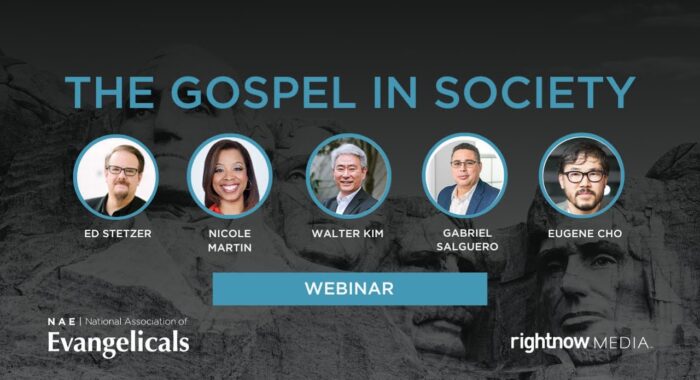Do you want to spend your life rearranging chairs on the deck of the Titanic, or do you want your life to have an eternal impact? This was the probing question we asked college seniors who were exploring God’s vocational direction for their lives at a weekend conference.
As a parachurch organization we were recruiting students to join our campus ministry. With youthful idealism and the best of intentions, we asserted only two things lasted forever: God’s Word and people’s souls. If students wanted their work to really matter, they would join our organization and do the Lord’s work.
Looking back, I realize that underlying much of our persuasive appeal was an impoverished theology reinforcing a sacred-secular divide. Are human souls all that matter? Is what we do for the majority of our daily lives really meaningless and of no eternal significance? Reflecting on the prevalence of the sacred-secular divide in much of contemporary evangelical missional thought and practice, I would like to raise four questions aimed at a more integral and robust biblical theology emerging from original creation and continuing to final consummation.
Has God Changed His Mind?
When God spoke the material world into existence, he declared it good. After the sixth day of creation, we read, “God saw all that he had made, and it was very good…” (Genesis 1:31). In Genesis 3, we encounter the tragedy of humankind’s fall into sin and the resulting disintegration of God’s very good world. Material creation and its downward spiral is marked with increasing corruption and wickedness.
In Genesis 6, God has what we might call creation remorse. God is grieved so much he considers completely wiping out humans and the material world. It would appear as if God has changed his mind about his good creation so badly gone awry. Yet against this black hole of darkness, a sparkling glimmer of hope arises as Noah finds favor in the eyes of the Lord (Genesis 6:8).
Instead of wiping out all of human and animal life, God rescued and preserved a small remnant of his very good creation. God’s redemptive action is important for us to grasp a more integral theology of our material world. When we devalue and deemphasize the material world and focus exclusively on the important task of rescuing souls for eternity, we miss the mark.
Paul Marshall aptly names this approach “lifeboat theology.” In “Heaven Is Not My Home” he writes, “However, a truly Christian viewpoint is not ‘lifeboat theology,’ but ‘ark theology’ instead. Noah’s ark saved not only people, but it preserved God’s other creatures as well. The ark looked not to flee, but to return to the land and begin again.”
If we are going to bridge the impoverished sacred-secular divide we must embrace a more robust theology of original creation, knowing God’s very good material world, though badly fallen, still matters to God and it must matter to us. God has not changed his mind about the goodness of the material world, nor his image-bearers’ unique place in it. Our cultural dominion mandate to cultivate and guard material creation has not ended (Genesis 2:15). Every part of material and spiritual reality rightly belongs to God. Abraham Kuyper put it this way: “There is not a square inch in the whole domain of our human existence over which Christ, who is Sovereign over all does not cry, Mine!”
God has always loved and valued his material creation. Redemption’s broad scope and future telos includes the now fallen created material world. Original creation has a disintegrated reality as well as a future glory.
What Is Creation Waiting For?
In his letter to the Romans, the Apostle Paul looks to Jesus not only as our personal Lord and Savior, but also as a cosmic redeemer. Paul makes the point that the material world is presently groaning, longing to experience the glory it once had in a sinless garden long ago. Paul writes, “For the creation waits in eager expectation for the children of God to be revealed” (Romans 8:19).
N.T. Wright speaks with illuminating clarity in “Surprised by Hope”: “What creation needs is neither abandonment nor evolution, but rather redemption and renewal; and this is both promised and guaranteed by resurrection of Jesus from the dead.” In many ways, the eighth day of new creation began at Jesus’ bodily resurrection. All creation is now waiting on tiptoe to be set free from its enslaving bondage to decay. Sacred-secular thinking diminishes material creation’s remaining goodness as well as its future glory.
Is It All Going to Burn?
The Apostle Peter’s eschatological language of the heavens and the material earth being burned with fire (2 Peter 3:10) has led to an errant conclusion that “it’s all going to burn.” The logical implication of this assertion is to devalue the material world, minimizing any continuity and asserting a radical discontinuity between the now and the not-yet future. Few theological errors have contributed more to the sacred-secular divide.
When we view the Apostle Peter’s language of fire in light of the entire canonical context, the eschatological burning description is better understood as a fire of purification rather than eradication. As vitally important as leading souls to Christ is, our vocational stewardship and kingdom mission is more comprehensive. N.T. Wright makes the point, “…the split between saving souls and doing good in the world is a product not of the Bible or the gospel, but of the cultural captivity of both within the Western World.”
Examining the Apostle John’s eschatological writing in the book of Revelation, we hear the bodily resurrected Jesus declaring not the eradication or destruction of material creation, but its stunning and glorious restoration and healing. Jesus says, “Behold, I am making all things new” (Revelation 21:5 ESV). It is important to note Jesus does not say, “I am making all new things.” God still deems his original yet fallen material creation as good with a glorious future.
Does Our Daily Work Matter?
Is it true that much of our daily lives have little ultimate meaning and no eternal significance? Are we pretty much rearranging chairs on the deck of a sinking Titanic world? Does our daily work matter?
God has put eternity in our hearts, but he has also placed our feet on solid earthly ground. Yes, we were made for more than time, but God who is outside of time created us in time. Our glorious eternal destiny does not diminish our very time-bound earthly callings, knowing our redeemed and restored future actually enhances our present lives with truth, goodness and beauty as we love and serve our neighbors.
When we bridge the sacred-secular divide, we value both the temporal and eternal, keeping in mind the eternal is of the highest value both in its infinite duration and glory.
Growing up, I often heard the affirming description of someone who was so heavenly minded they were not much earthly good. Yet, if we are truly heavenly minded, we will be of great earthly good. In “Mere Christianity” C. S. Lewis makes this point: “If you read history, you will find that the Christians who did most for the present world were precisely those who thought most of the next. It is since Christians have largely ceased to think of the other world that they have become so ineffective in this.”
The good news of the gospel is not only that it makes possible an eternal life in the future, it also makes possible an eternal kind of life now in the present. The gospel properly understood speaks into every nook and cranny of everyday time-bound material life as we live in God’s already, not-fully-yet kingdom.
After encouraging them to set their minds on things above, Paul instructs the Colossian Christians to really get down to earth displaying God-honoring diligence in their daily work. Paul writes, “Whatever you do, work heartily, as for the Lord and not for men, knowing that from the Lord you will receive the inheritance as your reward. You are serving the Lord Christ” (Colossians 3:23–34).
Heeding Paul’s words, we are to view all paid and unpaid work as sacred. If done unto God for the glory of God and love of neighbor, all work God calls us to do is to be an act of worship. Dorothy Sayers wisely bridged the sacred-secular divide when she declared, “The only Christian work is good work well done.”
Looking back to those weekend conferences with college students, I would have encouraged them to prayerfully consider pursuing a pastoral or missionary calling, but I also would have reinforced the goodness of other work God may be leading them to embrace in the world. I would have prayed that they would have great imagination for all the ways in which God may call them to serve him.
Tom Nelson serves as president of Made to Flourish. He is also the senior pastor of Christ Community Church in Kansas City. He has served on the Board of Regents of Trinity International University and is on the leadership team of the Oikonomia Network. Nelson is the author of “Work Matters: Connecting Sunday Worship to Monday Work,” “Five Smooth Stones: Discovering the Path to Wholeness of Soul,” “Ekklesia: Rediscovering God’s Design for the Church,” and “The Economics of Neighborly Love: Investing in Your Community’s Compassion and Capacity.” He graduated with a master’s of theology degree from Dallas Theological Seminary and received his doctorate from Trinity Evangelical Divinity School.




 View All Articles
View All Articles 





























